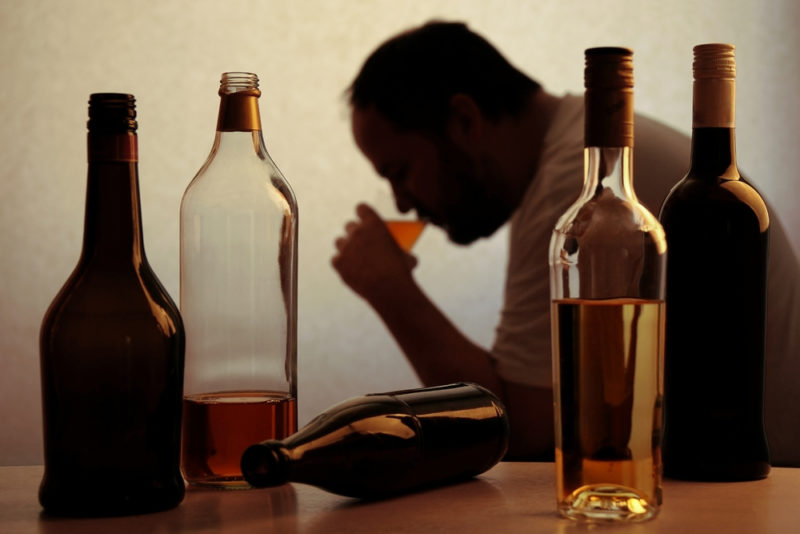An alcoholic is someone who cannot control his desire and use of alcohol. Many alcoholism symptoms can be exhibited when addicted, including the user being preoccupied with thoughts of drinking alcohol even at the risk of harming his health and safety. There are many reasons why a person may begin to drink, but once he is addicted to alcohol use it is very difficult and dangerous to wean himself off. Some people begin to drink as a social behavior that is expected by friends and business colleagues. Having drinks at lunch, supper, in the evening and on weekends may all revolve around social behavior to fit in with a peer or professional group.
Alcoholism Symptoms
Other people begin drinking to drown out their problems with money, relationships, health, abuse, and just about anything that they have difficulty coping with. Some people engage in binge drinking, especially when they are in a bar or at a party where other people are drinking too. Binge drinking is consuming a large amount of alcohol in a short amount of time, and it is very dangerous to one’s health. Alcoholism is a chronic, progressive disease that may lead to permanent physical and psychological problems.
Symptoms of Alcoholism:
There are many symptoms of alcoholism, with some being more obvious than others. If you would like to learn more about the symptoms of alcoholism, here are some to be aware of:
- You are having strong cravings to drink alcohol.
- Not being able to control or limit the amount of alcohol you drink, and not being able to stop drinking.
- Your body has built up a tolerance to alcohol and now you need to drink more to get the same effects as before.
- Letting go of familial, professional, scholastic and social obligations and responsibilities so that you can drink.
- Withdrawing from family, friends and activities you once enjoyed to spend your time drinking.
- Not being able to perform and function normally, like you did before you started drinking alcohol.
- Engaging in risky behavior such as driving, swimming, running heavy machinery, etc. while intoxicated.
- Disregarding the negative affects that alcohol is having on your health and other areas of your life.
- Experiencing withdrawal symptoms when you don’t drink.
Other Symptoms:
The physical symptoms that an alcoholic may experience can include slurred speech, nausea, vomiting, cancer, blackouts, loss of consciousness, delayed reflexes, high blood pressure, stomach problems, liver disease, heart problems, impairment of the central nervous system, brain damage and more. Alcohol is toxic to the brain and may cause mental disorders and permanent damage. Alcoholism is also a gender specific disease that affects women much differently than men. Women are adversely affected by alcohol in smaller amounts than men are, and are at risk of developing osteoporosis along with all the other health conditions listed above.
Some recognized factors that may lead to alcoholism are mental illness, genetic predisposition and the environment. Alcoholism is a serious disease that requires professional medical treatment. Withdrawal from alcohol may cause severe health complications and can be life-threatening. An alcoholic should only be weaned off of alcohol by experienced addiction specialists, preferably as an in-patient in a rehab facility. A medically supervised detoxification process is recommended, where the patient is monitored and kept stable throughout the procedure. Medications can be administered to control some of the detox symptoms, which can range from extreme anxiety, agitation, sweating, tremors, involuntary shaking, nausea, vomiting, hallucinations, convulsions, seizures and delirium tremens. Detoxification from alcohol is more dangerous than the disease of alcoholism itself, and should be performed by medical professionals to ensure the safety of the alcoholic.
If you or a loved one is experiencing alcoholism symptoms and needs help to recover from alcoholism you should speak to your family physician or contact a State certified rehabilitation center. Always remember that help is available to you through Cape May County Drug Treatment Centers. Our recovery advocates are just a call away at (609) 756-3686.


